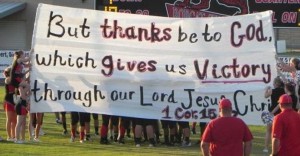The Oklahoma Supreme Court on Tuesday, November 20, decided that the Jenks and Union Public School Districts lack the standing to sue parents over their use of state educational vouchers that pay for their special education students to attend private K-12 religious schools. At issue was the Lindsey Nicole Henry Scholarship for Students with Disabilities Program (LNH) which allows the parent/guardian of a public school student with a disability to exercise their parental option and request to have an LNH Scholarship awarded for their child to enroll in and attend a private school, if the child is on an Individualized Education Program (IEP) prior to the request and has spent the previous school year in attendance at a public school in the state by being reported by a school district for funding purposes during that year.
The issue at hand is First Amendment separation of church and state issues, not special education law. The two districts believe that the LNH scholarships violate numerous principles of both the Oklahoma State Constitution and the federal United States Constitution. In relevant part, the Oklahoma Constitution reads
No public money or property shall ever be appropriated, applied, donated or used, directly or indirectly, for the use, benefit, or support of any sect, church, denomination or system of religion, or for the use, benefit, or support of any priest, preacher, minister, or other religious teacher or dignitary, or sectarian institution as such.
(Constitution of the State of Oklahoma; Article II, Section 5)
The Court’s decision does not address the constitutionality of the law but rather holds that the districts do not have the legal standing necessary to sue the parents of the children in the case. The basis for this ruling is that the districts are not suffering harm. In the decision, the Court states, “the funds at issue are not taxes from taxpayers in the districts’ county revenue streams that a county assessor is improperly reducing or disposing of, but part of the Legislature’s general grant to the districts, through the State Department of Education. Because the school districts are not the ones charged with the duty to provide free public education, the Legislature’s withholding of certain funds, even if it is unconstitutional, does not violate a constitutionally protected interest of the school districts themselves, because they are merely the Legislature’s vehicle.”
The decision came down 7-2. The two dissenting justices contended that the constitutional issues of the case had been fairly joined and should be considered. The ruling reverses a decision by a Tulsa district judge that ruled the program unconstitutional.
The districts are currently considering how to proceed in light of this decision.
Click here for a timeline of the legal battle. (Scroll to bottom of article.)


